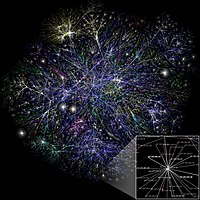
Photo from wikipedia
Disconnecting impaired or suspicious nodes and rewiring to those reliable, adaptive networks have the potential to inhibit cascading failures, such as DDoS attack and computer virus. The weights of disconnected… Click to show full abstract
Disconnecting impaired or suspicious nodes and rewiring to those reliable, adaptive networks have the potential to inhibit cascading failures, such as DDoS attack and computer virus. The weights of disconnected links, indicating the workload of the links, can be transferred or redistributed to newly connected links to maintain network operations. Distinctively different from existing studies focused on adaptive unweighted networks, this paper presents a new mean-field model to analyze the reliability of adaptive weighted networks against cascading failures. By taking mean-field approximation, we develop a new continuous-time Markov model to capture the propagations of cascading failures and the rewiring actions that individual nodes can take to bypass failed neighbors. We analyze the stability of the model to identify the critical conditions, under which the cascading failures can be eventually inhibited or would proliferate. The conditions are evaluated under different link weight distributions and rewiring strategies. Our model reveals that preferentially disconnecting suspicious peers with high weights can effectively inhibit virus and failures.
Journal Title: IEEE Transactions on Information Forensics and Security
Year Published: 2020
Link to full text (if available)
Share on Social Media: Sign Up to like & get
recommendations!